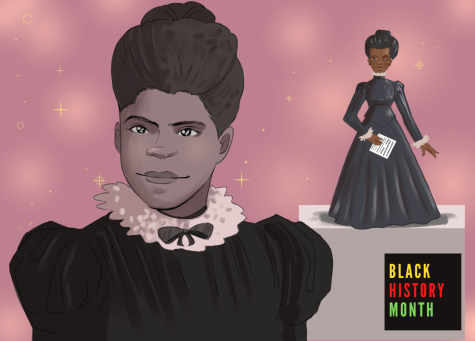Mattel celebrates journalist, civil rights activist Ida B. Wells with new Barbie: ‘It’s more than a doll’
February 17, 2022

A new limited edition Barbie doll honors Ida B. Wells and captures her time as editor at the Memphis Free Speech newspaper, where she exposed the racial injustices faced by Black Americans.
Members of the Columbia community expressed excitement about the doll and its historical significance as well as the importance of representation in children’s toys.
The doll is a part of Barbie’s Inspiring Women series, which also includes women such as Rosa Parks, Helen Keller and Ella Fitzgerald.
Wells, a civil right activist, educator and journalist posthumously honored with a Pulitzer Prize Special Citation and Award, rose to prominence in the South as an activist whose research and investigative reporting exposed the horrors of lynchings and the segregation and injustices faced by African Americans. She was later involved with the founding of the National Association of Colored Women’s Clubs and the NAACP. Her reporting appeared in major newspapers including the New York Age, the Chicago Defender and the Conservator in Chicago, and she published numerous in-depth pamphlets that were widely-shared.
Chicago’s former Congress Parkway, which borders Columbia College, was renamed Ida B. Wells Drive in 2019.
Wells’ great-granddaughter Michelle Duster, who is also an author, public historian and part-time faculty member in Columbia’s Business and Entrepreneurship Department, said she was “extremely excited” when she found out that Barbie selected Wells to be the fifth doll in their series of inspiring women.
“Mattel honoring Ida B. Wells with an inspiring woman Barbie doll is very exciting. It’s a really great honor for there to be a doll made in her likeness,” Duster said. “It introduces a new and younger generation to her and hopefully will inspire them to learn about who she was.”
Duster views Barbie releasing women of color dolls as an educational and interactive opportunity for children to tap into history.
The doll is seen wearing a traditional, deep blue, floor-length dress with lace details on the bodice and collar. The Barbie holds a Memphis Free Speech and Headlight newspaper to commemorate Wells’ outspoken civil rights efforts while she co-owned and edited the newspaper.
“I think it’s important for children to be introduced at a young age to the idea that women of color existed, that they’re represented in dolls and when they’re real women, to learn about who these women were,” Duster said. “I’ve seen several dolls that are African American women, but they’re not based on a historical figure, so that just adds an extra layer when the doll is represented in the image of somebody who really did live.”
Duster wrote a children’s book, “Ida B. Wells, Voice of Truth,” which honors her great-grandmother’s legacy, and a young adult book, “Ida B. the Queen.” She has been involved in many projects to celebrate Wells and “lifting up the stories” of civil rights activists before the 1960s.
Mikaella Lukban, sophomore theatre major, said it’s “iconic” that Barbie is giving dolls “substance” by representing suffragists and civil rights activists in their collections.
“Having toys that reflect the people that play with the toys is very important,” Lukban said.
Mattel’s Instagram account for Barbie said: “Barbie is proud to honor the incredible Ida B. Wells as the newest role model in our Inspiring Women series, dedicated to spotlighting heroes who paved the way for generations of girls to dream big and make a difference.”
Evyn Johnson, a junior music business major at Columbia, said as a Black girl growing up, giving kids of color a doll that reflects history is a “good educational standpoint.”
“Ida B. Wells was a huge, strong-minded Black woman and Black monument, especially within Black history,” Johnson said.
Johnson said there were other ways that toy companies could also show appreciation for Black women.
“One way [they] can help is not only use different tone complexion on the dolls to signify that they are Black but also different features, because not every Black woman or woman in general look the same or has the same features,” Johnson said.
Shanita B. Akintonde, associate professor of instruction in the Communication Department, could not have Barbie dolls growing up. Because Mattel didn’t manufacture Black Barbie dolls in the ’70s, Akintonde’s mother refused to buy them for her.
“When I talk about the need to have representation, I’m not just talking about Black representation,” Akintonde said. “I think it should be [representative] across the board.”
Akintonde also mentioned that her sorority, Alpha Kappa Alpha Sorority, Inc., had a special doll designated for them.
“At the end of the day, that makes the buyers have even more affinity for the Barbie brand. Because if I can buy a Barbie that looks like me or that represents things I believe in, then I’m really feeling good about that,” Akintonde said. “It’s more than a doll at that point, it’s a token.”
Akintonde said having women of color Barbies adds to the representation of children seeing themselves, their skin tones and features in the dolls.
“When you insert an added layer of significance to [playing], which is by having a civil rights icon like Ida B. Wells as part of that child’s imaginative landscape, now you’ve opened up the possibilities for them to not only think about what can be but to learn from what has been,” Akintonde said. “[Wells] wasn’t a frolicker, she was a fighter and journalist and a civil rights activist, abolitionist, fought against hangings, so she has a large repertoire.”
The Wells Barbie is available on the Mattel Creations site for $35 and is sold at select Target and Walmart stores.







